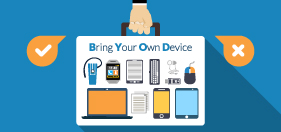MDM Solutions for BYOD Policies : Ensuring Security and Productivity in a Connected World
Nov 29, 2023 | 42Gears Team
The rise of mobile technologies has revolutionized the way businesses operate. Employees are now equipped with smartphones and tablets, enabling them to work on-the-go and stay connected at all times. With the increasing popularity of Bring Your Own Device (BYOD) policies, where employees use their personal devices for work purposes, organizations have been able to enhance flexibility and productivity.
However, the BYOD trend also presents challenges related to security, data protection, and device management. To mitigate these risks while reaping the benefits of a BYOD policy, organizations turn to Mobile Device Management (MDM) solutions.
In this blog, we will discuss the significance of MDM solutions, like SureMDM, in BYOD scenarios and explore their role in ensuring security and productivity.
The Significance of BYOD Policies
Bring Your Own Device policies have gained traction in recent years, primarily due to the growing dependence on mobile devices. Employees prefer using their personal devices because of their familiarity and convenience, which leads to increased productivity and job satisfaction. On the other hand, businesses benefit from cost savings as they no longer need to provide company-issued devices to every employee.
While BYOD policies offer numerous advantages, they also bring a set of challenges that businesses must address. Key concerns include data breaches, unauthorized access, device loss, and potential compliance issues. This is where Mobile Device Management solutions come into play.
What is Mobile Device Management (MDM)?
Mobile Device Management refers to a set of tools, policies, and processes that enable organizations to monitor, manage, and secure mobile devices used within their networks. MDM solutions empower businesses to strike a balance between flexibility and control over employee-owned devices, ensuring that sensitive company data remains protected.
Significance of MDM Solutions for BYOD Policies
1. Security Enhancement
The foremost advantage of implementing MDM solutions is the bolstered security they offer. With MDM, IT administrators can enforce robust security measures such as passcode requirements, encryption, and biometric authentication on all registered devices. These measures protect company data from unauthorized access in the event of device theft or loss.
MDM solutions also enable remote device locking and wiping, allowing businesses to quickly respond to security threats and safeguard sensitive information. Moreover, the ability to configure firewall settings and limit app downloads minimizes the risk of malware and data breaches.
2. Simplified Device Management
Managing a diverse fleet of mobile devices can be overwhelming without proper tools in place. MDM solutions offer centralized management, giving IT administrators complete visibility and control over registered devices. This allows for streamlined device enrollment, configuration, and updates, saving valuable time and resources.
Through an MDM console, administrators can remotely troubleshoot device issues, deploy software updates, and push necessary configurations, ensuring all devices are up-to-date and optimized for productivity.
3. Separation of Work and Personal Data
One of the critical challenges of BYOD policies is the mingling of personal and work-related data on employee devices. MDM solutions enable containerization, which effectively segregates personal and business data. This means that employees can access work-related applications and data within a secure container, isolating them from their personal apps and information.
Containerization ensures that work data remains secure and doesn't get inadvertently mixed with personal content. It also grants businesses the ability to remove corporate data without affecting personal files, even in situations where employees leave the organization or retire their devices from BYOD programs.
4. Improved Productivity and Efficiency
Contrary to popular belief, implementing MDM solutions doesn't lead to intrusive micromanagement of employee devices. On the contrary, MDM enables a more efficient and productive work environment.
Through MDM, businesses can provide employees with access to essential work-related applications, data, and resources while restricting access to non-essential apps that could lead to distractions. This balance ensures that employees remain focused and productive during work hours while enjoying the flexibility of using their preferred devices.
Conclusion
As the BYOD trend continues to shape the modern workplace, the importance of Mobile Device Management solutions cannot be overstated. MDM solutions provide a crucial layer of security, data protection, and streamlined management in the context of BYOD policies.
With the right MDM solution in place, organizations can embrace the benefits of BYOD without compromising on security or productivity. By ensuring a clear separation of personal and work-related data, enforcing security protocols, and adhering to compliance requirements, MDM solutions like SureMDM become indispensable allies for businesses striving to thrive in an increasingly connected and mobile world.
Are you looking for MDM solutions for
BYOD policies?
Subscribe for our free newsletter


